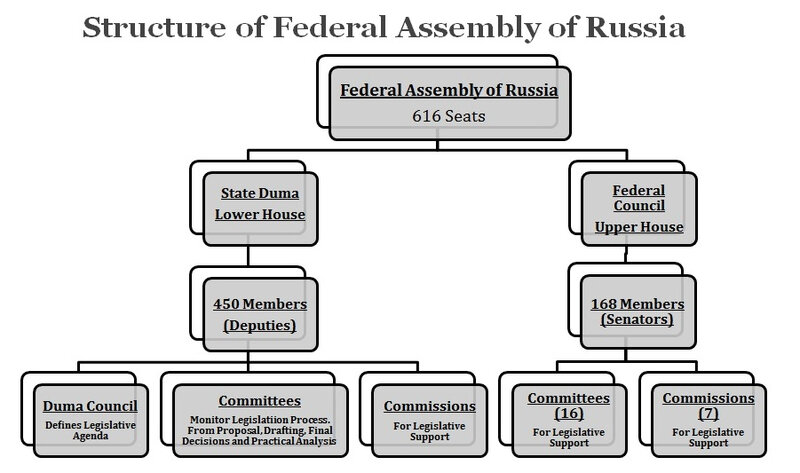Presentation of the Russia's government
The Government of Russia exercises executive power in the Russian Federation. The members of the government are the Prime Minister, the deputy prime ministers, and the federal ministers. It has its legal basis in the Constitution of the Russian Federation and the federal constitutional law "On the Government the Russian Federation".
According to the 1991 amendment to the 1978 Russian Constitution, the President of Russia was the head of the executive branch and headed the Council of Ministers of Russia. According to the current 1993 Constitution of Russia, the President is not a part of the Government of Russia, which exercises executive power. But, the President does appoint the Prime Minister. The Chapter 6 of the Constitution of Russia says, that "The Government of the Russian Federation consists of the Chairman of the Government of the Russian Federation (Prime Minister), Deputy Chairman of the Government of the Russian Federation and federal ministries".

After the fall of the Soviet Union, the Russian Council of Ministers had become the main executive body. At some points it contained over 69 state committees, 16–17 ministers, 5 federal services, and over 46 governmental agencies. After the 2004 reform, government duties were split between 17 ministries, 5 federal services, and over 30 governmental agencies. The Russian Federation practices asymmetrical federalism. This means that not all regions are treated fairly and that some regions have been given more autonomy than others. There are 7 super regions (federal districts) with a super governor that answers to the President. Those super regions include the South, Central, North-West, Far East, Siberia, Ural, Volga, and North Caucasus. They were established in May 2000.
The prime minister, currently Dmitry Medvedev, is appointed by the president (currently Vladimir Putin), and confirmed by the State Duma. He or she succeeds to the presidency if the current president dies, is incapacitated, or resigns.
Corruption is common and widespread in the government. According to 2016 results of Corruption Perception Index of Transparency International, Russia ranked 131st place out of 176 countries with score 29. Multiple anti biggest stances taken against corruption is the formation of the Anti-Corruption Council in 2008.
Here are some indications on the people composing the government:



/https%3A%2F%2Fstorage.canalblog.com%2F26%2F30%2F1579423%2F119895579_o.jpg)
/https%3A%2F%2Fstorage.canalblog.com%2F51%2F68%2F1579423%2F119895903_o.jpg)
/https%3A%2F%2Fstorage.canalblog.com%2F30%2F28%2F1579423%2F119261907.jpg)
/https%3A%2F%2Fstorage.canalblog.com%2F16%2F49%2F1579423%2F119895704_o.jpg)